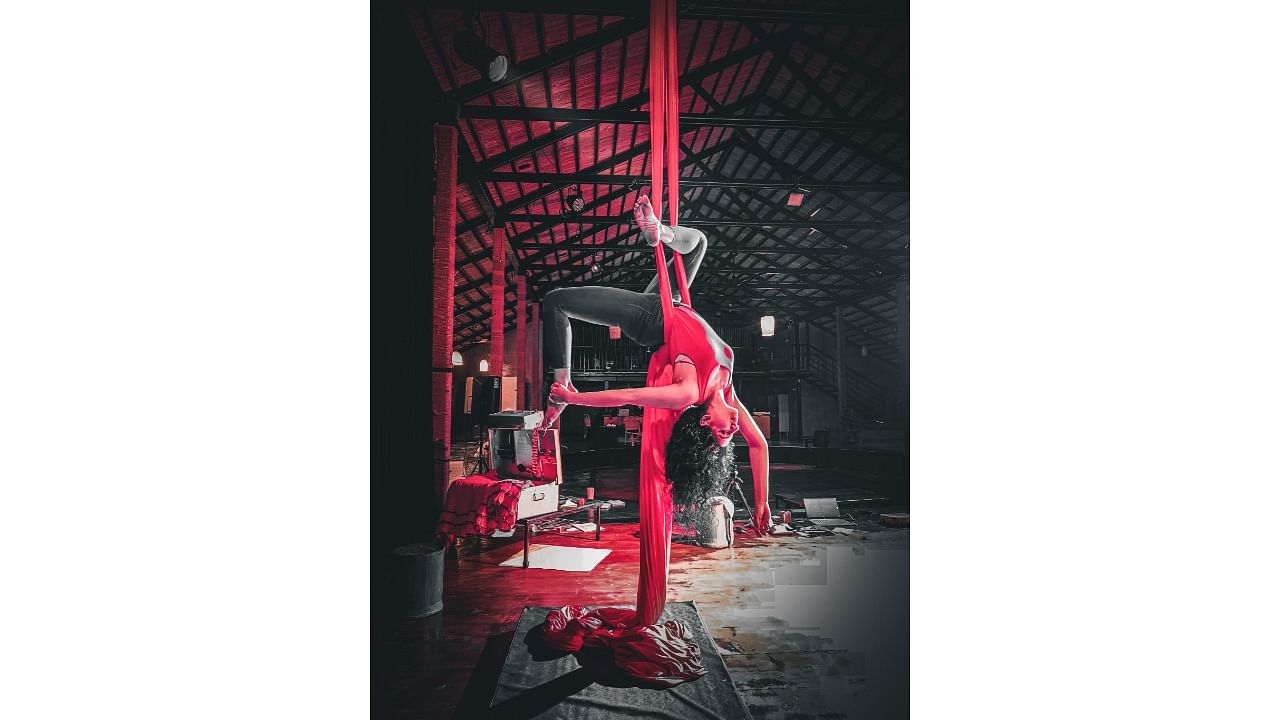
The play was supported by India Foundation for the Arts (IFA) and incubated at Prakash Raj’s Nirdiganta, near Srirangapatna.
Credit: Dh Photo/ Vishakha N
Sharanya Ramprakash’s new play ‘Project Darling’ began life as a research project on the subject of the “bawdy” women from the Kannada Company Nataka genre. The “sexual clown” so to speak. During her research, the award-winning director of ‘Akshayambara’, noticed that the “bawdy woman” had gone missing! Thus, ‘Project Darling’ coalesced into a play about five actors in search of a missing woman, another actor. It brings to mind Pirandello’s ‘Six Characters in Search of an Author’, where the art of theatre takes centrestage.
The play was supported by India Foundation for the Arts (IFA) and incubated at Prakash Raj’s Nirdiganta, near Srirangapatna.
The markers of Indian contemporary theatre that move it forward from Theatre of Roots are interesting and complex because of the weight of tradition we carry. While contemporary theatre might engage with traditional forms, it foregrounds lived experience and is politically courageous. This complexity is epitomised in ‘Project Darling’ where the perfect female character, as per the Natya Shastra, is constructed on stage. Having loaded her with massive cultural baggage, an actor asks about consent, to which another actor retorts — “What consent?! We have culture.”
A terrific ensemble of actors, including Shrunga B V, Surabhi Vashist, Shobana Kumari, Shashank Rajashekar, and Matangi Prasan, begin by visibilising the materials both of the research — cameras, photographs, typewriter, whiteboard, as well as of the play — props, costumes, screens, red aerial silk.
A projection shows 88-year old Manjulamma from Stree Natak Mandali singing ‘Game of Love’, the 50s’ hit by Anglo-Indian singer Tony Brent, ending with the words ‘kiss me tight’. This image holds hints of transgressions to follow. The story behind the character of Khanavali Chenni from the play, ‘Bus Conductor’, forms the dramaturgical spine. Who are the actresses who played Chenni? What was the impact of the double entendre? Why did the character eventually eclipse the play? If she was so popular, why is she missing?
Bravely balancing documentary sources with theatricality, the ensemble uses tropes beloved of Company Nataka; they clown, sing, dance and employ chorus, storytelling and humour to great effect. The audience laughs uproariously while remaining aware of the underlying commentary about gender hypocrisy.
Three scenographic moments bear mentioning. The first involves a rudely recounted memory of an actress sitting on an old chair in the “mané-angala”. The choreography around the chair is evocative and nostalgic. It neatly segues into the actress Malthishree’s story about the sale of chairs having provided her pension. The second involves a hilarious and convention-defying sex scene between the lovelorn Basappa and the only visible part of Chenni, her rani-pink clad legs and jasmine entwined braid. The third is the poignant aerial scene accompanied by an audio recording of an anonymous Mysore actress speaking about a miscarriage she underwent on stage. The play is bookended by Rameshwari Verma, feminist and theatre artist, speaking about the historically male-directed Kannada stage.
Watching ‘Project Darling’, I was reminded of an old advertising tagline — We’ve come a long way, baby. Indeed, we have. The contemporary Indian theatre landscape is inhabited by women directing, acting, curating and developing new work. This play was exhilarating to witness, and is an apt homage to the many women like Bangalore Nagarathnamma, Hubbali Helen and Chindodi Leela who, among others, built the stage for us.
Navu yaaru. Namma hindunavaru yaaru. Ee rangabhoomi yannu kattidavaru yaru.